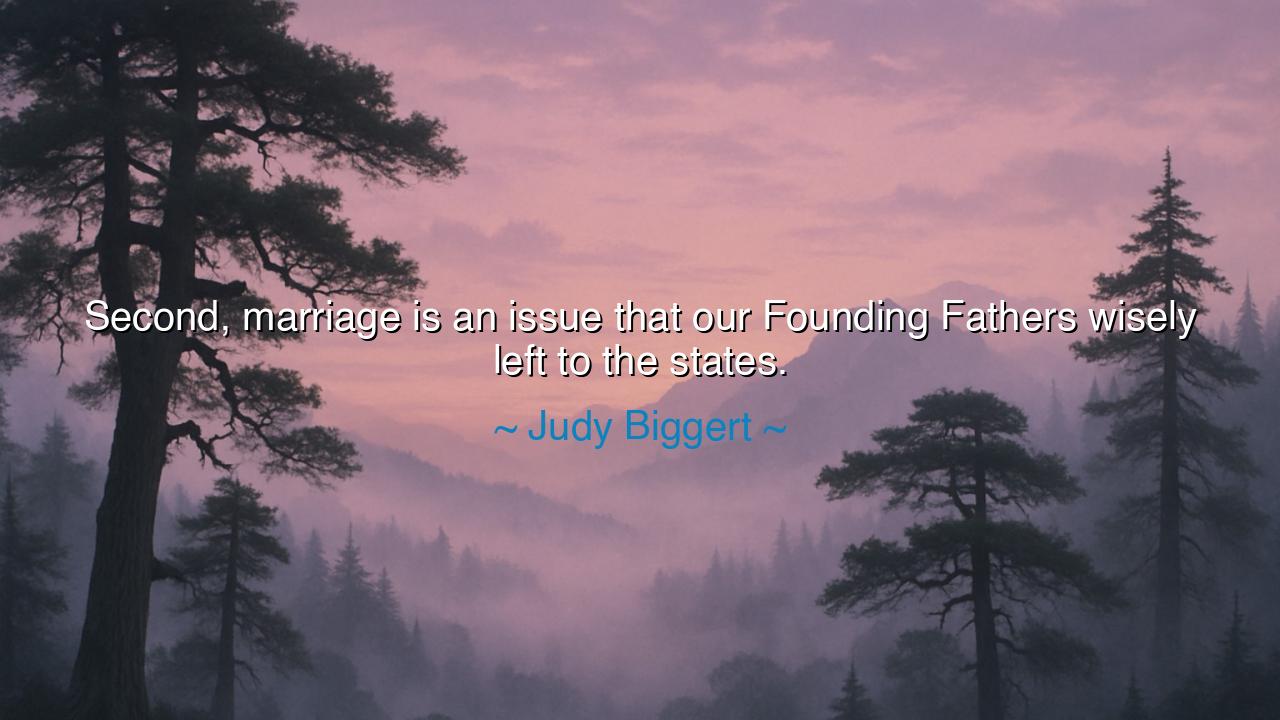
Second, marriage is an issue that our Founding Fathers wisely






“Second, marriage is an issue that our Founding Fathers wisely left to the states.” — Thus declared Judy Biggert, with words that echo not only through the halls of modern politics, but deep into the ancient struggle between freedom and governance, unity and diversity. Her statement, though grounded in the law, carries the spirit of timeless wisdom: that power, when too tightly held, becomes tyranny, but when wisely shared, nurtures liberty. In this truth, we find the balance upon which nations endure — the understanding that not all matters of the human heart should be ruled from the heights of distant authority, but from the nearness of community, conscience, and choice.
The Founding Fathers, in their deliberations beneath the flickering candles of the eighteenth century, forged a republic not by accident but by deliberate restraint. They understood that the strength of the Union would not lie in uniformity, but in federalism — a structure that honors both the unity of the whole and the freedom of the parts. In their wisdom, they did not decree the shape of marriage, nor the limits of family, nor the customs of the hearth. These, they knew, belong to the living heart of the people — to the states, where culture, faith, and tradition intertwine like the roots of an ancient tree.
For marriage, in its essence, is more than a contract of law; it is the weaving together of lives, shaped by the customs of time and the beliefs of community. No distant hand of government can define its full meaning without wounding its spirit. To leave marriage to the states, as Biggert reminds us, was to acknowledge that love and union are not one thing to all people. What is sacred in one region may be ordinary in another. Thus, the founders preserved both liberty and diversity — ensuring that the people might govern their private institutions according to their own lights, within the bounds of justice.
Consider, then, the wisdom of James Madison, who wrote that “the powers delegated by the Constitution to the federal government are few and defined.” He knew that the heartbeat of a free nation depends upon the restraint of its rulers — that the nearer power is to the governed, the more just it becomes. The matter of marriage, rooted as it is in religion, culture, and personal conscience, was left to the states not out of neglect, but out of reverence. It was an act of trust in the people’s capacity to shape their own moral destinies, and to grow, in time, toward greater understanding and inclusion.
Yet, through the ages, the question of marriage has become more than local — it has become the stage upon which justice and equality wrestle. In the struggle for interracial marriage, in the long road to same-sex marriage, the boundaries between federal and state power have been tested, stretched, and redefined. When Loving v. Virginia came before the Supreme Court in 1967, two souls — Richard and Mildred Loving — dared to challenge the ancient barriers that divided race and heart alike. Their love became the crucible in which freedom was reforged, proving that the Constitution’s promise of equality must, at times, rise above the confines of local law.
And so, we see that the wisdom of the Founding Fathers was not in freezing the world as it was, but in giving it room to grow. By leaving marriage to the states, they created a living system — one that could evolve through debate, through struggle, through the moral awakening of each generation. The tension between state power and federal justice has, in truth, been the engine of progress. For in that friction lies the opportunity to rediscover, again and again, what liberty truly means.
O listener, take from this teaching a lesson for your own life: wisdom often lies not in control, but in trust — not in dictating from above, but in empowering from below. Whether in government or in family, whether in law or in love, unity thrives when freedom is honored. Do not fear diversity of thought or tradition; it is the soil from which new understanding grows. The founders’ vision, and Biggert’s reflection upon it, remind us that strength is not born of sameness, but of balance — a harmony between authority and autonomy, between principle and compassion.
Thus, remember: the greatness of a nation, like the harmony of a marriage, depends not on domination, but on mutual respect. The Founding Fathers knew this truth, and so they left certain matters — the tender, the personal, the sacred — in the hands of the people themselves. It is our task, in every generation, to prove worthy of that trust: to govern wisely, to love justly, and to keep freedom alive not by decree, but by understanding.






AAdministratorAdministrator
Welcome, honored guests. Please leave a comment, we will respond soon